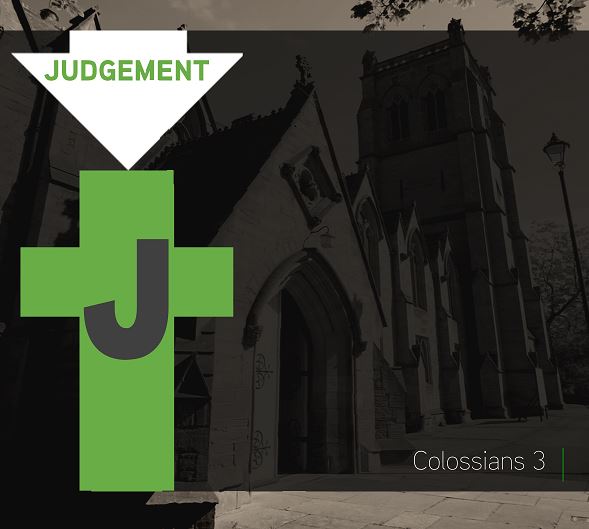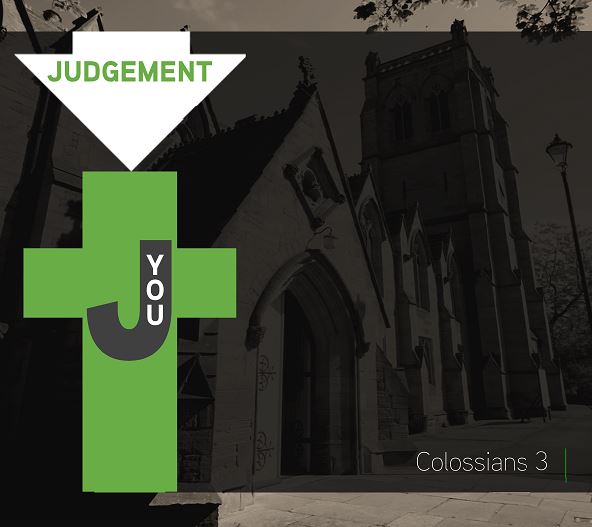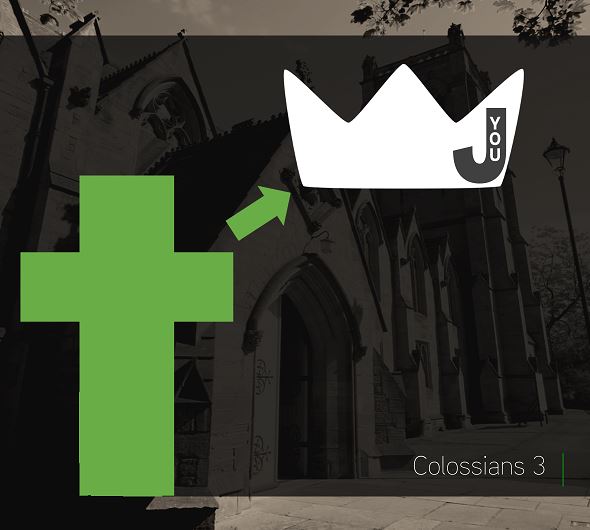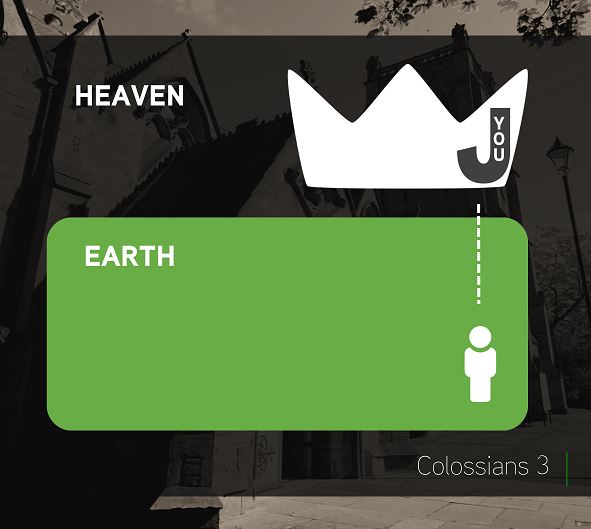Resources
12 November 2023
10:30am
What does being a Christian look like?
Please have a seat. And let me say two things before we turn to the Bible. One is a totally inadequate thank you from myself and Tess and Beth and Naomi for your extraordinary love and support as our church family, since Ellie died. Thank you especially for praying for us and for our faith, which is the most invisible but most important way you’ve loved us. The other thing to say is that since we’re in a series on the Bible book of Colossians, this isn’t going to be a Remembrance themed sermon. But as we’ll see at the end, it has one powerful application to a divided and warring world. So let me lead us in prayer:
Father,Please continue to use this book of Colossians to show us what being a Christian, what having Jesus as Lord, is really about.In his name, Amen
I wonder who’s the newest Christian here? Some of us wouldn’t yet call ourselves Christians – we’re just looking into it, others here have been Christians for decades, but maybe you put your trust in Jesus just last week or last month. In which case, you may then have asked yourself: ‘So, what now? How do I go on from here?’ What does being a Christian look like? And you need to be careful whose answer you listen to. So, go to Northumberland Street and you’ll find the Jehovah’s Witnesses’ answer. They’ll say: ‘It’s great that you’re going to church, and trusting in Jesus and…’ But then comes the ‘but’. ‘But now you need something else, something extra – that we can tell you about.’ And Paul wrote Colossians to new Christians in danger of falling for that kind of message. So would you open a Bible at page 984. That will get you to Colossians 2. And let’s revise Paul’s key point to them, at the top of the page, look at Colossians 2.6-7:
Therefore, as you received Christ Jesus the Lord, so [How do you go on from there? Well, read on:] walk in him, rooted and built up in him and established in the faith, just as you were taught
In other words, how you go on is simply to deepen the relationship with Jesus that you’ve begun. You don’t need anything else or anything extra. And that’s why the rest of Colossians 2 has been negative, because it’s been warning us off any message that says we need to do something else, something extra, to be acceptable to God. Colossians 2 has told us that’s not how you go on. Being a Christian is not about doing a lifetime of stuff, hoping it’ll make you acceptable to God in the end. It’s about trusting that Jesus’ death for your forgiveness has made you totally acceptable right from the start – and then living inside that acceptance to please him. And in Colossians 3 this morning, we come to the positive of what that looks like – what it looks like, as Colossians 2.6 puts it, to walk in Christ. So look down to Colossians 3.1, which begins:
If then you have been raised with Christ
Then look back to Colossians 2.20, and it says:
If with Christ you died
So Paul is saying being a Christian is about living out the reality that you’ve died with Christ and have also been raised with Christ. So what does that mean? Well, if you know a bit about the Christian message (maybe from Hope Explored or Christianity Explored) you’ll know it is all about Jesus’ death and resurrection, and what those events mean for us. So the Bible says that when Jesus died, he was paying for the forgiveness we need; and that when God his Father raised him from the dead, it was to show that he hadn’t died for any sin of his own, but for ours – and that he’d paid off the judgement for it in full. And sometimes the Bible describes Christians as people who are trusting in Christ and his death and resurrection – so Jesus is the object of their faith. But sometimes, like in Colossians, it describes Christians as people who are in Christ– where Jesus isn’t so much the object of their faith, as the place where they live. Like being ‘in Jesmond’ or ‘in Heaton’. Only that illustration isn’t relational enough. So it would be better to say: it’s like being in marriage. So I’m married to Tess, and the way the Bible sees the marriage union is that it’s as if I live in Tess and she lives in me. And that’s how the Bible describes those of us trusting in Jesus. It says: we’re united with him and we live in him.
So, back to the question: what does it mean that those of us trusting in Jesus have died with him and also been raised with him? Well, just think about this book and this bookmark. Let me drop the bookmark there and close the book. So now the bookmark is in the book, united with the book.
So that wherever the book goes, the bookmark goes with it, because it’s ‘in book’. It’s the same for the unborn babies here this morning. Where Mum has been, they’ve been, thanks to being ‘in Mum’. And where Mum goes tomorrow they’ll also go, ‘in Mum’. So now bring that idea to what happened when Jesus died and rose again:

So there’s a picture of Jesus on the cross, taking on himself the judgement for our sin – so that we could be forgiven, and yet justice still be done. And we don’t think of ourselves as being in that picture – after all, we weren’t even around on Good Friday. Or were we?

Because, next picture, if you’re trusting in Christ, the Bible says that in God’s sight you were there. You were there, in Christ, and you and your whole lifetime’s sins were taken under that judgement they deserve. That’s what it means that you died with Christ.

But next picture, Jesus was raised out from under that judgement, and returned to his Father’s presence in heaven. And if you’re trusting in Christ, then in God’s sight, that happened to you, too, because you’re in Christ. Which is what it means that you were raised with Christ. It means that in God’s sight, you too are now in his presence in heaven, completely accepted and welcomed. Which hurts your head, doesn’t it? Because look at this next picture.

You thought you were here on earth, in the box of time and space, sitting in JPC, and that’s how you look to me, too. But in God’s sight, if you’re in Christ, then you’re somehow with him in heaven already. Or maybe we should say ‘with him in heaven in principle’? Or maybe we should borrow Paul’s phrase from elsewhere, that: Our citizenship is in heaven (Philippians 3.20). So if you’re in Christ, you’ve got dual citizenship. You’ve got citizenship here and citizenship in heaven. But your citizenship in heaven is the far greater reality about you, because that’s where you really belong, and that’s who you really are. And the moment you die, or Jesus comes again, that reality will become your complete experience. And Paul is saying: you need to get your head around all that to answer the question,
‘How do I go on from here? What does being a Christian look like?’ Because in Colossians 3 he says it looks like living as a citizen of heaven even though you’re still a sin-spoiled citizen of earth. So look down to Colossians 3.1 again:
If then you have been raised with Christ, seek the things that are above, where Christ is, seated at the right hand of God. Set your minds on things that are above, not on things that are on earth.
So where does living for Jesus tomorrow at school or uni or work or wherever begin? It begins by lifting our spiritual eyes to heaven and to the risen Lord Jesus on the throne, and by seeing that, along with his Father and the Spirit, he is so obviously more important, more central, more of an overriding priority than anything or anyone else there; and by seeing that he is so obviously the only person to live for and to please, and whose approval really matters. And then we have to bring that heaven-mindset into tomorrow at school or uni or work or wherever, and to aim to live for Jesus here as we would if were there. And Colossians 3.2 says:
Set your minds on things that are above, not on things that are on earth
for the obvious reason that there are plenty of things and goals on earth that look more important, more central, more of an overriding priority than anything else. And there are plenty of people on earth who look like the only people to live for, and to please, and whose approval really matters. So the non-Christian boy/girl-friend you can’t bring yourself to break up with looks like that. But they’re not. The academic achievement for which you’re willing to sacrifice your family life and even spiritual health looks like that. But it’s not. The approval of your friends at school or your colleagues at work looks like that. But it’s not. Paul says: lift your spiritual eyes to the risen Jesus and your citizenship in heaven, and then you’ll see how to live on earth more clearly. Let’s read on, Colossians 3.3:
For you have died, and your life is hidden with Christ in God. When Christ who is your life appears, then you also will appear with him in glory.
That’s talking about when Christ will appear again when he comes again.
And we’re told, you also will appear with him in glory. Which doesn’t just mean ‘in heaven’ as if glory was another word for the place. And it doesn’t just mean we’ll be bathed in his glory. It means we will finally be made glorious ourselves – when all the sinfulness in us is eradicated, and we can be the people we were made to be and want to be. I once visited one of our senior saints over the last weeks of his life. He had terrible nerve pain that seldom went away. And as we talked about life beyond this life, I said to him ‘You must be looking forward to being rid of your pain.’ And without hesitation he said ‘Not as much as I’m looking forward to being rid of my sin.’ That’s right, isn’t it? Just imagine being rid of your sin. So that your will no longer has any tendency at all to deviate from Christ’s. So that your will is completely, happily, trustfully submitted to his will – because as you finally see him face to face, nothing else is possible. Colossians 3.4 says: that’s what awaits us, if we’re in Christ. Which brings Paul to his therefore. Look on to Colossians 3.5:
Put to death therefore what is earthly in you
In other words, put to death whatever behaviour belongs to this fallen world, but has no place in heaven, and no place in our lives if we’re citizens of heaven – even though we’re still horribly capable of it. So, Colossians 3.5:
Put to death therefore what is earthly in you: sexual immorality, impurity, passion, evil desire, and covetousness, which is idolatry.
So in the New Testament, the word translated sexual immorality means all sexual activity outside of heterosexual marriage. And the next three words also have sexual overtones: impurity, passion, evil desire. Now God created sexual passion and desire to bring a man and a woman together in marriage, and to bond them together in marriage. So sexual passion and desire are good, as created. But we now live in a fallen world and we’re all fallen people with fallen desires. Which means we can’t look inside ourselves and say ‘Everything I desire must be good – and good for me to live out.’ And it also means that our desires go looking for fulfilment in God-substitutes, rather than in God himself. And that’s why Colossians 3.5 ends:
and covetousness [in other words, controlling or overriding desire], which is idolatry
Because idolatry is simply looking to a God-substitute instead of God. Which is what we’re doing, for example, if and when we look at pornography. We’re looking for comfort or reward or escape from loneliness or fulfilment of unfulfilled desires. But instead of looking to God for those things, we’re looking to a God-substitute that can’t deliver. And Paul says we need to put all that Colossians 3.5 behaviour to death. Which doesn’t mean we can ‘kill off’ temptation in this area (or any other) so that it’s never a problem again. It means a lifelong attitude of resisting wrong desires, rather than living them out. And the key to that is going back to Colossians 3.1-4, and seeing ourselves in the light of our citizenship and future in heaven.
So for example, I remember talking to a Christian guy here, long since moved on, who I’ll call Mark. And Mark once said to me in total discouragement ‘I don’t think I’ve changed at all in the area of sexual holiness and I don’t think I ever will.’ He said ‘I keep slipping into undressing women in my mind and thinking about them wrongly, and so on. And I’m beginning to think that I just am lustful – that that’s the real me.’ So I said to him ‘Do you believe Jesus will get you to heaven?’ And he said ‘Yes.’ So I said, ‘Do you think he’ll finally get the sin out of you in the process – including this sin?’ And he said ‘Yes’. So I said, ‘So this won’t be part of you in heaven?’ And he said, ‘No, it won’t.’ So I said, ‘That’s the answer to how to think about yourself now. If it won’t be part of you there, then it’s not part of the real you here – and you need to keep treating it and resisting it in that light.’ So there’s the positive motivation of knowing that these things will not be part of us in glory. But there’s also the negative motivation of knowing how seriously God is against them. Look at Colossians 3.6:
On account of these the wrath [or judgement] of God is coming.
And those of us trusting that Jesus has saved us from that judgement must never lose sight of what God thinks of the sins he’s forgiven us. Read on, Colossians 3.7-8:
In these you too once walked, when you were living in them. But now you must put them all away: [and here comes another area of behaviour – anger that spills out as words that spread damage and dirt] anger, wrath, malice, slander, and obscene talk from your mouth.
And like Mark felt that lust was just part of the real him, others of us may feel that anger is just part of the real us – unchangeable, unmoveable.
But again, we have to start by going back to Colossians 3.1-4 and working out what is the real me in the light of my citizenship and future in heaven. So to end with, onto Colossians 3.9-10:
Do not lie to one another [another form of damage by words], seeing that you have put off the old self with its practices and have put on the new self which is being renewed in knowledge after the image of its creator.
And Colossians 3.10 is important, because it’s easy to think, especially when we’re discouraged, that we’ll see no change in ourselves this side of heaven. But Colossians 3.10 says: Christ is at work in us and we are being renewed, from the inside of new desires, to the outside of albeit imperfect living for him. So that we can echo what John Newton, the author of Amazing Grace, once wrote:
I’m not what I should be, I’m not what I want to be, and I’m not what I one day will be, in heaven. But by the grace of God I can say: I’m not what I once was.
Now we could hear this part of God’s Word in a very individualistic way. We could think it’s about what it means for me to be a Christian, it’s about my walk with Christ. But every you in this passage has been plural. And Colossians 3.9-10 literally reads:
Do not lie to one another, seeing that you have put off the old [not self, but literally] man [ie, humanity] with its practices and have put on the new [not self, but literally] man [ie, humanity], which is being renewed in knowledge after the image of its creator.
So of course we have to turn to Christ individually – but that brings us corporately into this new humanity, the worldwide church family, along with everyone else who’s turned to him. So just look how corporate Colossians 3.11 is, to end with:
Here [in this new humanity in Christ, in the church family – here] there is not Greek and Jew, circumcised and uncircumcised, barbarian, Scythian, slave, free; but Christ is all, and in all.
So Paul lists there the main divisions within humanity in his day – the divisions which caused hatred and racism and nationalism and superiority and inferiority and fighting and war. And we could write an equivalent list today, starting with Palestinian and Israeli. And he doesn’t mean there are literally none of these kinds of people in the church – that would be an empty church. He means that Christ has brought all these kinds of people together into his church – but that the labels Jew and Greek and all the rest are no longer their real identity. In Christ, they’re no longer what matters most to them, and therefore they’re no longer what divides them and causes hatred and racism and nationalism and superiority and inferiority and fighting and war. Because, end of the verse:
Christ is all [in other words, all that ultimately matters to them], and in all
And yet again, the key to that is going back to Colossians 3.1-4, and seeing ourselves and one another in the light of our citizenship and future in heaven. Because if we’re going to be in heaven together, perfectly united around the risen Jesus, and perfectly loving one another, then we better get practising and approximating to that now.
So here’s my promised Remembrance Sunday application. We look round the world at its wars and conflicts, and wonder ‘What can we do?’ And we can remember them. And pray about them. And do small but significant things to meet humanitarian needs – especially of Christian brothers and sisters in situations where other aid won’t reach them. But above all, we can seek to live out Colossians 3.11 here in this church family. And we can pray that church families in deeply divided parts of the world will also seek to live out Colossians 3.11. Because that way, we will (albeit imperfectly) show the world that there is a power which can overcome hatred and racism and nationalism and superiority and inferiority and fighting and war. And that is the power of Christ; to bring people back into relationship with God through his death and resurrection, and so to create a new humanity that looks like nothing else on earth, and that’s ultimately heading for heaven. And in this fallen, war-filled, suffering-filled, death-filled world, that’s the only real hope there is.
